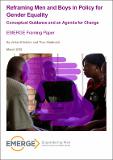| dc.contributor.author | Edström, Jerker | |
| dc.contributor.author | Shahrokh, Thea | |
| dc.date.accessioned | 2016-03-15T08:49:51Z | |
| dc.date.available | 2016-03-15T08:49:51Z | |
| dc.date.issued | 2016-03-15 | |
| dc.identifier.citation | Jerker Edström and Thea Shahrokh (2016) ‘Reframing Men and Boys in Policy for Gender Equality: Conceptual Guidance and an Agenda for Change, EMERGE Framing Paper, Promundo-US, Sonke Gender Justice and the Institute of Development Studies, Brighton: IDS | en |
| dc.identifier.uri | https://opendocs.ids.ac.uk/opendocs/handle/20.500.12413/10037 | |
| dc.description.abstract | Gender inequality remains a critical challenge and threatens to severely undermine progress towards the new Sustainable Development Goals (SDGs).1 On average and globally, women only earned in 2015 what men earned almost a decade earlier and they accounted for only 18 per cent of ministers in government by 2015.2 However, women spend two to ten times more time on caring for children or older persons than do men (World Bank 2012). It is also estimated that 35 per cent of women worldwide have experienced either physical and/or sexual intimate partner violence or sexual violence at some point in their lives.
This continued challenge is recognised in the policies and commitments of various development agencies. For example, the UK government’s new development strategy (DFID and HM Treasury 2015) emphasises mainstreaming the empowerment of women and girls under its strategic objective of ‘tackling extreme poverty and helping the world’s most vulnerable’, also seen as linked to stability, security and opportunities for all. The SDGs also recognise these challenges, with a stand-alone goal for gender equality (SDG 5) having seven of its nine targets specifically addressing women’s disadvantage.
However, whilst many gender equality policies and programmes only target and work with women and girls, compelling evidence and experience shows that engaging men and boys in these processes is crucial for lasting change. Drawing on global evidence from the Department for International Development (DFID)-funded EMERGE programme, this paper explains why better engaging men and boys is crucial, the implications for reframing policy design and implementation, and provides key recommendations for policy. | en |
| dc.language.iso | en | en |
| dc.publisher | Institute of Development Studies, Promundo-US and Sonke Gender Justice | en |
| dc.relation.ispartofseries | EMERGE;Framing Paper | |
| dc.rights | You are free to:
Share — copy and redistribute the material in any medium or format
Adapt — remix, transform, and build upon the material
For any purpose, even commercially. The licensor cannot revoke these freedoms as long as you follow these license terms.
License terms: You must give appropriate credit, provide a link to the license, and indicate if changes were made. You may do so in any reasonable manner, but not in any way that suggests the licensor endorses you or your use. | en |
| dc.rights.uri | http://www.ids.ac.uk/files/dmfile/IDSOpenDocsStandardTermsOfUse.pdf | en |
| dc.subject | Gender | en |
| dc.title | Reframing Men and Boys in Policy for Gender Equality: Conceptual Guidance and an Agenda for Change | en |
| dc.type | Series paper (non-IDS) | en |
| dc.rights.holder | Institute of Development Studies, Promundo-US and Sonke Gender Justice | en |
| dc.identifier.team | Gender and Sexuality | en |

